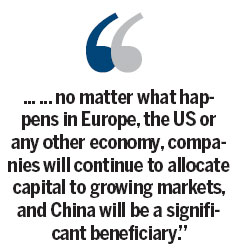Pessimists ignore China's strengths
Updated: 2013-08-02 08:51
By Oliver Barron (China Daily)
|
|||||||||||

The economy is still attracting foreign investment, and those funds will sustain its long-term growth
China is slowing. Repeat, China is slowing. Is China's annual growth going to fall below 7.5 percent? Can the economy continue to function at 7 percent? Dare we ask what would happen if the economy slows to 6.5 percent? Won't the wheels come off if it slows any more?
If you talk to a portfolio investor, it seems that China has no way out.
The argument is that, since China has too much debt that needs to be repaid, a slowdown is not an option as slower growth means less revenue that can go toward paying back debt.
On the other hand, if the country keeps growing fast, it will only add more debt that can't be repaid, as each additional yuan invested becomes less productive. It presents a sort of "damned if you do, damned if you don't" scenario.
There is a lot of pessimism about China's current situation. Take a step back, however, and you will see that the people making these comments, whether they are media or fund managers, do not have a lot invested in China's future. When you look at those who have invested in its future, a different, more optimistic picture begins to emerge.
As China's growth has slowed this year, from 7.9 percent in the fourth quarter of last year to 7.5 percent in the second quarter of this year, foreign direct investment has been increasing, rising from the previous year in each of the past five months and growing by 20.1 percent in June to $14.4 billion (10.86 billion euros), the fastest pace in two years.
There are clearly many reasons to be optimistic about the long term. China is no longer just the world's manufacturing base, and rising wages in a country of 1.3 billion people who have shown an affinity for buying luxury goods makes China a market that can't be overlooked.
The areas where foreign investors are focusing are now reflecting this change in mentality. Manufacturing foreign direct investment, which historically produced goods for export, fell 2.14 percent year-on-year in the first six months of this year, while FDI in the services sector rose 12.4 percent year-on-year.
Short-term factors are also driving FDI, and they can be explained by looking at its sources. Asian economies, as usual, account for the largest share of FDI. Of greater importance is the fact that FDI from the three major economies - the EU, the US and Japan - is rising quickly, up 14.7 percent, 12.3 percent and 14.4 percent year-on-year. Of the three markets, the most notable is clearly the EU, which was the only market in which FDI fell last year.
It could be argued that the change in EU FDI reflects the improving economy, as business activity in the eurozone expanded in July for the first time in 18 months. But this conclusion seems a bit premature.
Despite some positive data, unemployment is at its highest level since the euro was created, public spending is low due to continued fiscal austerity and banks remain reluctant to lend. It is not out of the question that Greece, Cyprus and Portugal could need further bailouts, while in France, the second largest economy in the region, growth is expected to decline this year.
As the outlook for European growth remains murky, companies there have little to gain by investing domestically, meaning they must look overseas. And with uncertainty over whether Abenomics will work in Japan and whether the US has really turned the corner, you must instead look to the place that can generate the most stable growth in the next few years.
Taking this into consideration, there may be no better place to invest right now than China. Although the Chinese government is allowing growth to slow, the slowdown will only go so far. The government must always ensure the economy grows fast enough to prevent major job losses in order to avoid social instability. This means there will always be a floor to growth.
Because of this, no matter what happens in Europe, the US or any other economy, companies will continue to allocate capital to growing markets, and China will be a significant beneficiary.
The author is head of the Beijing branch of UK-based investment bank NSBO.
(China Daily European Weekly 08/02/2013 page9)
Today's Top News
List of approved GM food clarified
ID checks for express deliveries in Guangdong
Govt to expand elderly care
University asks freshmen to sign suicide disclaimer
Tibet gears up for new climbing season
Media asked to promote Sino-Indian ties
Shots fired at Washington Navy Yard
Minimum growth rate set at 7%
Hot Topics
Lunar probe , China growth forecasts, Emission rules get tougher, China seen through 'colored lens', International board,
Editor's Picks

|

|

|

|

|

|





